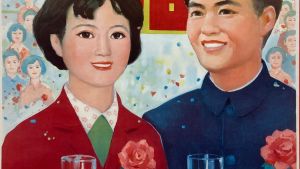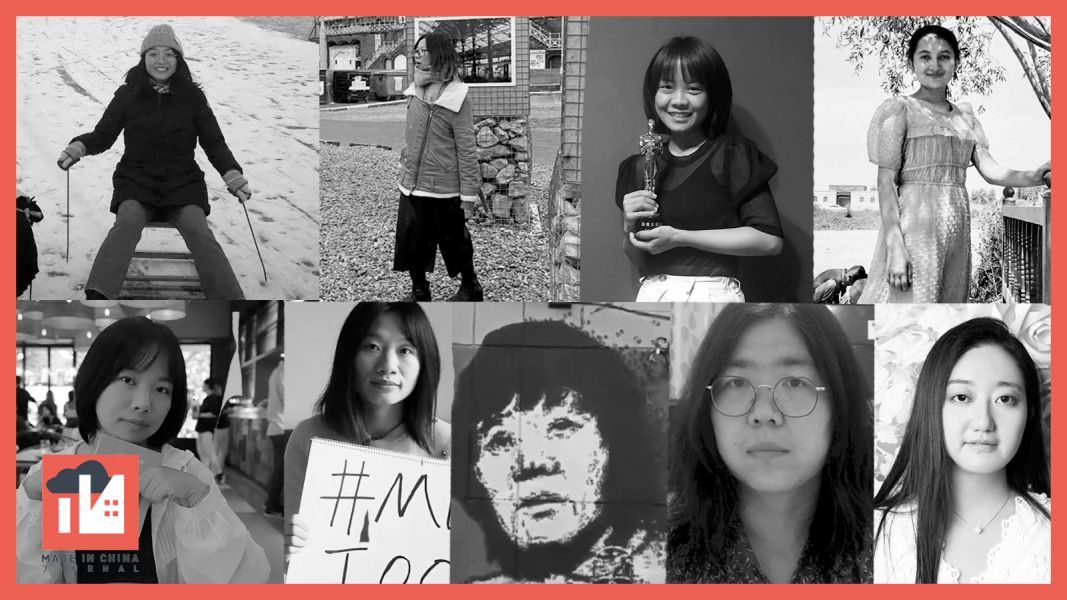
Lest We Forget: The Missing Chinese Activists of 2021
Back in December 2019, we published a series of portraits of labour and feminist activists who disappeared into China’s legal system in what was a particularly brutal year for activism in China. At that time, a wave of arrests had just engulfed dozens of activists across several sectors and cities, and several of them were still detained under Residential Surveillance at a Designated Location (RSDL)—usually at a government-managed facility rather than in their own homes, despite the name—a system that permitted them to be held for long periods without trial and without any contact with their families, friends, or lawyers. As it turned out, all of them were either sentenced and released or simply let go without fanfare in the following months.
Two years on, the Chinese authorities persist with this modus operandi, and activists old and young continue to disappear into the system. The cases we document this year present many similarities with 2019. The detention of activists for legitimate social activism—for instance supporting worker rights and gender equality, or holding the government accountable—has continued, and RSDL remains the main method used against them. Once detained, except for a letter to their family to notify them of their detentions and charges, they have little or no communication with the outside world for months and months. Families and friends are warned not to speak out or talk to the media and solidarity actions are very difficult.
But there are important differences, too. In 2021, it has become even less clear than it ever was before what many of the activists have been detained for. While in some cases a specific reason can be pointed to as a possible cause for the detention, in many other instances these activists seem to have been detained simply for not having given up their activism. This points towards a new strategy of preemptively intimidating and detaining activists and destroying their networks before they can be mobilised. Those who persist in their activism invariably feel isolated and powerless. With this new gallery, we remember some of those who have disappeared, and pay respect to their commitment.
The Editors
Li Qiaochu 李翘楚

Li Qiaochu is a young activist with a long history of campaigning for women’s and labour rights. She came to the fore as an important voice in Chinese civil society during the forced evictions of migrants that took place in Beijing at the end of 2017—a topic that she discussed in this co-authored essay. At the end of 2019, Qiaochu attempted to draw attention to the latest crackdown on civil rights activists, which included among its targets her partner Xu Zhiyong, a leading Chinese human rights lawyer. At the onset of the Covid-19 pandemic, she participated in a volunteer team to provide free masks to sanitation workers and help women suffering from domestic violence. As a consequence, she was put under close surveillance, with public security agents stationed outside her house and following her anywhere she went. On 16 February 2020, just a few hours after Xu Zhiyong was detained, she went missing. China’s state security bodies would hold her incommunicado until 19 June under the RSDL system on suspicion of ‘inciting subversion of state power’. After her release, she published this account—which we translated and republished with her permission—in which she recounted the uncertainty and terror that she experienced in the four months she spent in detention. In the following months, she unceasingly spoke up for her detained partner, In December 2020, she accepted the PEN America 2020 PEN/Barbey Freedom to Write Award on his behalf. Forced into house arrest, on 5 February 2021 she tweeted about Xu Zhiyong and activist Ding Jiaxi having been tortured in detention. The following day, police from Linyi County, the locality in Shandong Province where Xu was detained, travelled to Beijing and took her away. She was formally arrested on 15 March on charges of ‘inciting subversion of state power’ and to this day remains under detention. Having been diagnosed with depression two years ago, according to her lawyer and friends her mental health has now further deteriorated due to long-term harassment and detention.
Fang Ran 方然
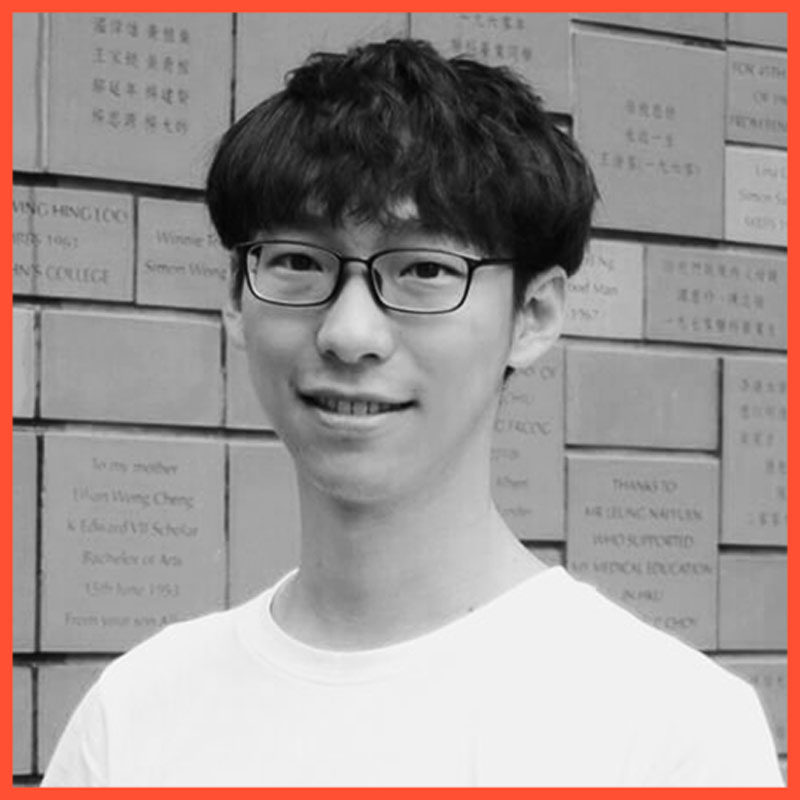
A soft-spoken doctoral student at the University of Hong Kong, Fang Ran was in mainland China to conduct research when he was detained in his hometown of Nanning, Guangxi Province, on 26 August 2021. Harassment and detention were not new to him—he had been taken away and questioned several times before. As recently as June 2021, he was questioned by state security agents in Guangdong Province, who confiscated his ID, phone, and computer. In August, he was urged by state security agents to return home to pick up his phone and computer. Unconcerned, he returned but this time faced a far more serious charge of subverting state power. Fang Ran has been active in student activist and labour circles for many years, dating back to his undergraduate days at Tsinghua University. A co-founder of the Research Association of Political Economics and Modern Capitalism at Tsinghua University, he was among a new generation of radicalised college students engaging in critical studies and discussions on Marxism that run counter to the official version. Deeply interested in China’s labour movement, Fang Ran has been working with labour NGOs and activists, as well as conducting academic research on Chinese workers. It is unclear what led to his arrest, and no explanation has been provided by the Chinese authorities. The University of Hong Kong has made no public statement about the arrest.
Chen Guojiang 陈国江, aka Mengzhu 盟主
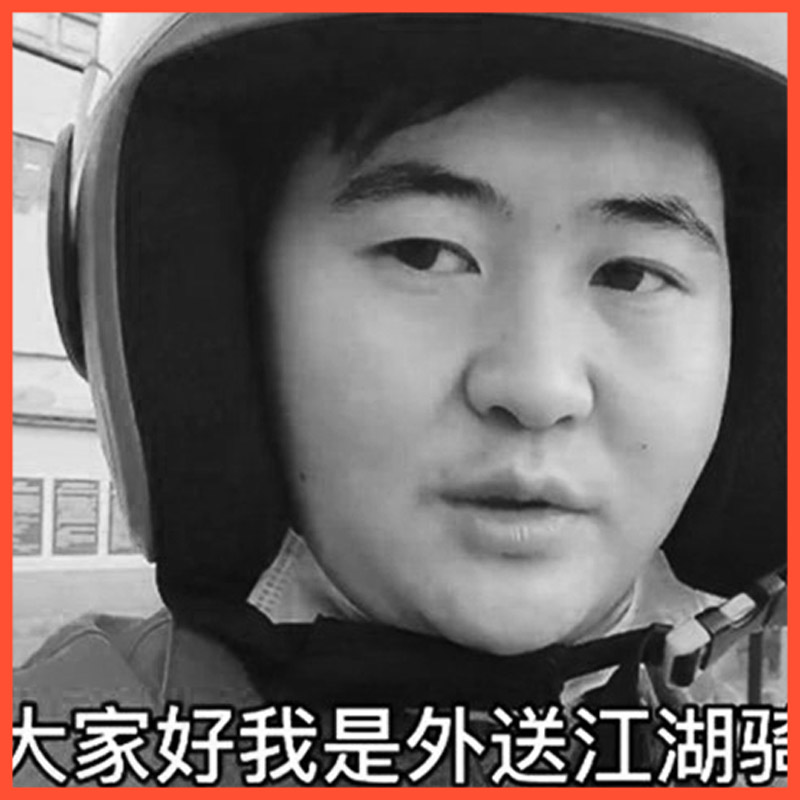
Chen Guojiang, a former delivery worker who goes by the nickname of Mengzhu, is one of the very few new worker leaders who emerged in China in the last couple of years. As an older generation of labour activists and leaders were arrested or otherwise put under surveillance and sidelined, Mengzhu became a strong voice for the hundreds of thousands of delivery workers in China’s burgeoning platform economy. Largely working individually, these workers nevertheless formed informal mutual aid networks via social gatherings and WeChat groups and in the past few years have occasionally mobilised in protest of cuts to their delivery fees or wage arrears. Mengzhu emerged from such networks as a recognised leader through his public criticisms of the labour rights record of delivery companies in the chat groups, on his personal Weibo, and via his short videos on the platforms Kuaishou and Douyin. Prior to his detention in February 2021, he managed over a dozen WeChat groups with more than 14,000 workers, and had led a call to stop taking orders from the two main Chinese delivery platforms Ele.me and Meituan in protest of delivery fee cuts in 2019. Shortly before being arrested, Mengzhu had launched another online campaign against Ele.me for manipulating a bonus program during the Chinese New Year. There are rumors suggesting that he might have been released but these have yet to be confirmed.
Huang Xueqin 黃雪琴
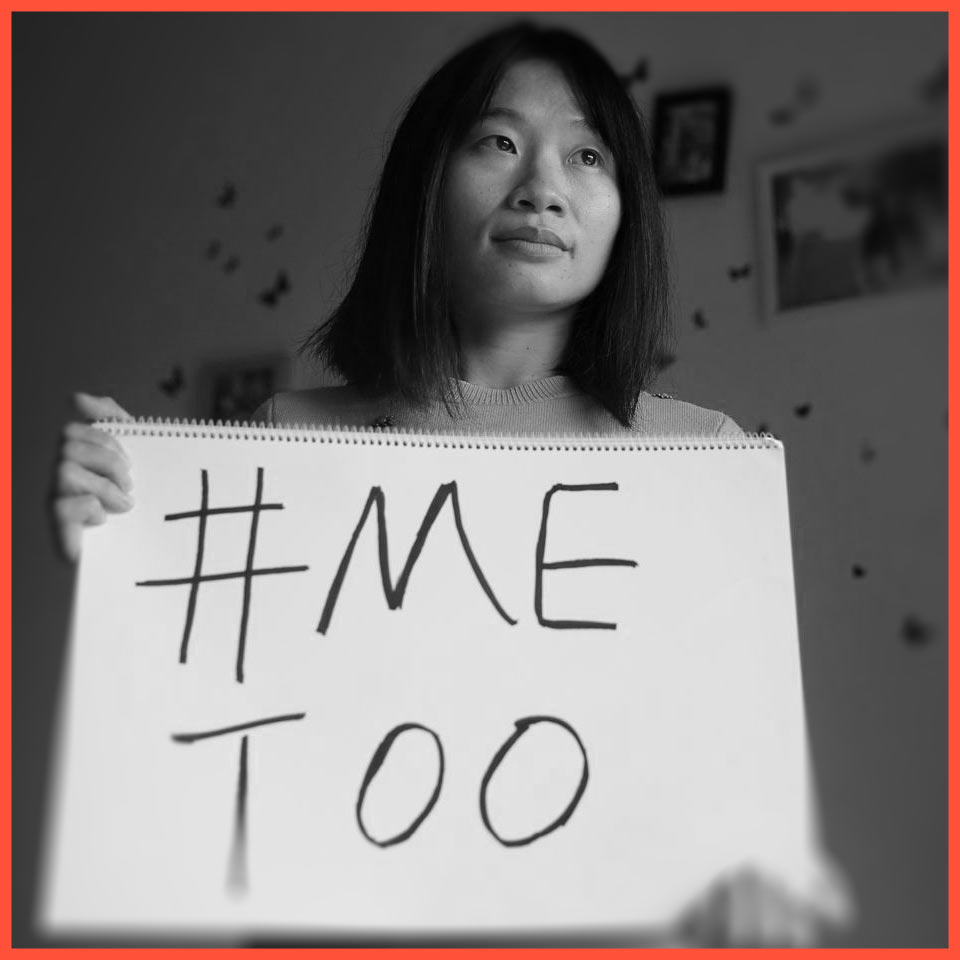
Xueqin was one of the nine activists we profiled in our Lest We Forget gallery in 2019. Detained on 17 October 2019 for ‘picking quarrels and provoking trouble’ and placed under RSDL shortly before moving to Hong Kong to study law, Xueqing was released on bail in January 2020. A seasoned investigative journalist, prior to her arrest she had exposed sexual harassment during China’s #MeToo movement. Chinese feminist activists leading campaigns against sexual harassment and gender-based violence have come under serious attacks in recent years both online and offline, as the Chinese government has repeatedly linked them to ‘hostile foreign forces’. Against such attacks, many continue to speak out and seize opportunities to raise public awareness of violence and discrimination against women. This time, Xueqin was on her way to depart for the United Kingdom to study at the University of Sussex with a Chevening Scholarship when she and her friend Wang Jianbing were taken away on 19 September. Both have been charged with ‘inciting subversion of state power’, but it is unclear what crimes they have committed or what incidents led to their arrest. 112 alumni of the Chevening Scholarship have issued a statement asking for Xueqin’s release.
Wang Jianbing 王建兵
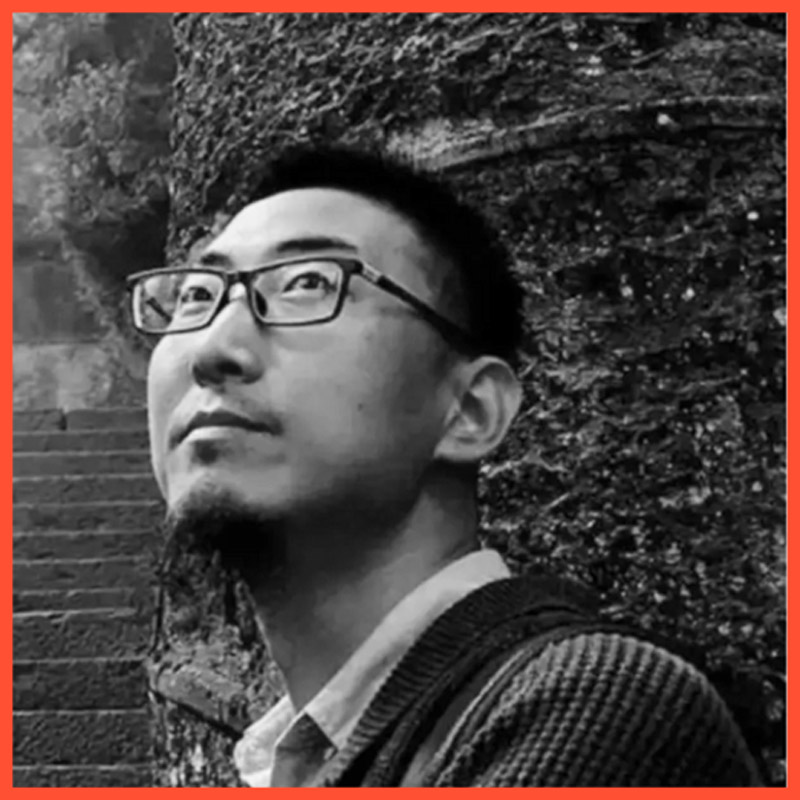
Tall and sporting a goatee, friends describe Wang Jianbing as down-to-earth, warm, and dependable. He has been a veteran of the civic movement in China for a decade and half. Soon after college graduation in 2005, Jianbing joined a foundation in Beijing to work on rural development and led projects on rural youth education. In 2014, he moved to Guangzhou and shifted his focus to community youth development and empowerment, and since 2018 has been supporting workers who suffer from occupational injuries and diseases. He is also an ardent supporter of China’s #MeToo movement, and has worked against sexual harassment and assault. As China’s civil society spaces are closed off, activists like Jianbing have keenly felt the impact on both their activism and mental state. A close friend recalled a conversation with Jianbing who candidly shared his despair: ‘People like us don’t have a future and cannot see hope. Without owning a house or a car, I cannot even dare to date or get married.’ He was detained on 19 September while accompanying Xueqin to her departure for the United Kingdom and was then charged with ‘inciting subversion of state power’ along with her.
Zhang Zhan 张展
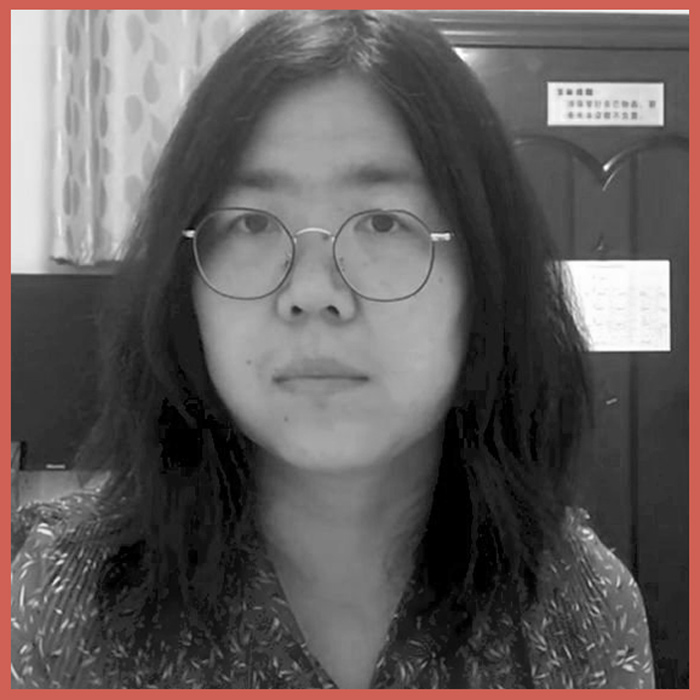
Zhang Zhan, a lawyer-turned-citizen journalist, was sentenced to four years in jail in December 2020 on the charges of ‘picking quarrels and provoking trouble’ for her coverage of the Chinese authorities’ initial handling of the Covid-19 outbreak in Wuhan. In February 2020, Zhang travelled from Shanghai to Wuhan to document what was happening at the epicentre of the first coronavirus outbreak. For more than three months, she wrote critical essays and live-streamed her video reports from Wuhan’s streets and hospitals on social media, including WeChat, Twitter, and YouTube. Her first video post on YouTube was entitled ‘My Claim to the Right of Free Speech’. She went missing in Wuhan in mid-May 2020, and was later revealed to have been taken by the police and detained in Shanghai. Since June 2020, she has been on an intermittent hunger strike in protest against what she called an ‘unlawful detention and indictment’. In August 2021, she was hospitalised for 11 days due to severe malnutrition after an extended hunger strike. In October 2021, her brother said that she was severely underweight and close to death. Zhang’s family have sought medical parole, asking the authorities to release her so she can receive medical treatment. Zhang, 38, was born in Shaanxi Province, and started a career as a lawyer in Shanghai in 2010. She began participating in human rights and political activism in 2013. She was previously warned by police for allegedly inciting subversion in 2018, and in April and November 2019 was detained for voicing support for Hong Kong activists. Among a number of other citizen journalists detained or disappeared for their coronavirus reporting in China, Zhang was the first known to be sentenced. She was awarded the 2021 Reporters Without Borders Press Freedom Award in the category ‘Journalistic Courage’. Despite the many voices all over the world calling for her release, the Chinese authorities still refuse to let her go.



